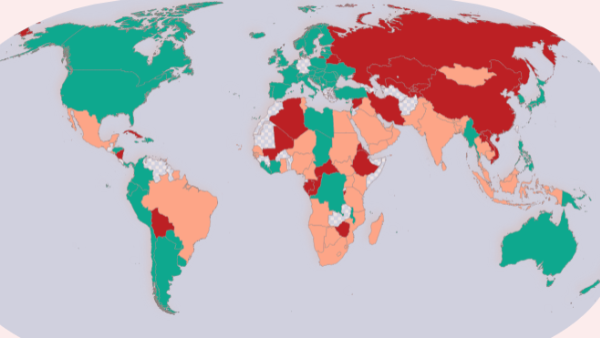The war launched by Russia in Ukraine and the attitude of other countries towards it may at first glance seem like a battle between democracy and autocracy. However, closer inspection shows that this view is misleading.
This is well demonstrated by the votes of individual countries in the UN General Assembly, which suspended Russia’s membership of the Human Rights Council. The main reason was allegations that Russian soldiers killed civilians. Russia then handed over the mandate.
The resolution, initiated by the United States, achieved the two-thirds majority of voting members required to adopt it. 93 countries supported, 24 opposed and 58 abstained – their votes did not count in the final tally.
The interaction of world democracy does not occur
Of course, most democratic countries condemned Russia’s invasion of Ukraine and also voted to suspend its membership in the UN Human Rights Council. But the world’s most populous democracy, India, for example, abstained – as did Latin America’s largest democracies, Brazil and Mexico.
India is among those who prioritize national interests over idealism. After all, it gets most of its modern weapons from Russia. “India relies on arms imports from Russia, and also has nuclear power, Pakistan, as a neighbour,” explains Pavel Havlíček of the Association for International Affairs (AMO) for Seznam Správy. “In addition, they import a lot of fertilizer from Russia, which is essential for the survival of a billion people.”
Similarly Brazil or South Africa have trade relations with Russia that are not decisive but significant. The Republic of South Africa even identified NATO’s expansion as the reason it should have provoked Russia into the war.
In turn, the Arab world’s only functioning democracy, Iraq, abstained from voting on a UN General Assembly resolution condemning the Russian invasion. In the same way, Asia’s second largest democracy – Indonesia – does not condemn Russia.
A detailed review of Asian countries shows that Russia’s exclusion from the international community is considered somewhat ambiguous. From an East Asian perspective, this is – simply put – war in a country thousands of kilometers away.
Fareed Zakaria, an American political scientist of Indian origin, points out that “the idea of a grand ideological campaign against autocracy makes most developing countries nervous. Many of them have strong economic ties to China and are closely linked to other autocratic regimes around them”.
How to frame the world today?
According to Zakaria, the current division of the world can be understood as between countries that believe in a rules-based international order and those that do not. “Russia has emerged as the world’s leading evil nation intent on attacking the core of this order: the norm that borders are not changed by force. Moscow is trying to return to the realm of pure power politics, where, in Thucydides’ words, the strong do what they want. they can and the weak suffer what they have to bear.”
Zakaria was referring to former British foreign secretary David Miliband, who saw the division of the world based on adherence to international rules as much more diverse than the division of democracy versus autocracy.
For example, Singapore is not a fully liberal democracy, but consistently upholds international norms and values. At the start of the Russian invasion, he decided – for the first time in more than 40 years – to join international sanctions, although the UN Security Council did not drop him because of Russia’s veto.
European optics lost in the world
Pavel Havlíček of AMO also opposes the simple division of the world into democratic and non-democratic. “Not only Asia, but also Latin American countries view the war in Ukraine as less principled, but more pragmatic. In African countries, echoes of antipathy towards the former colonial powers are also felt. From the point of view of previously colonized countries, it might be acceptable that Russia is trying to weaken their influence.”

“Tv nerd. Passionate food specialist. Travel practitioner. Web guru. Hardcore zombieaholic. Unapologetic music fanatic.”







